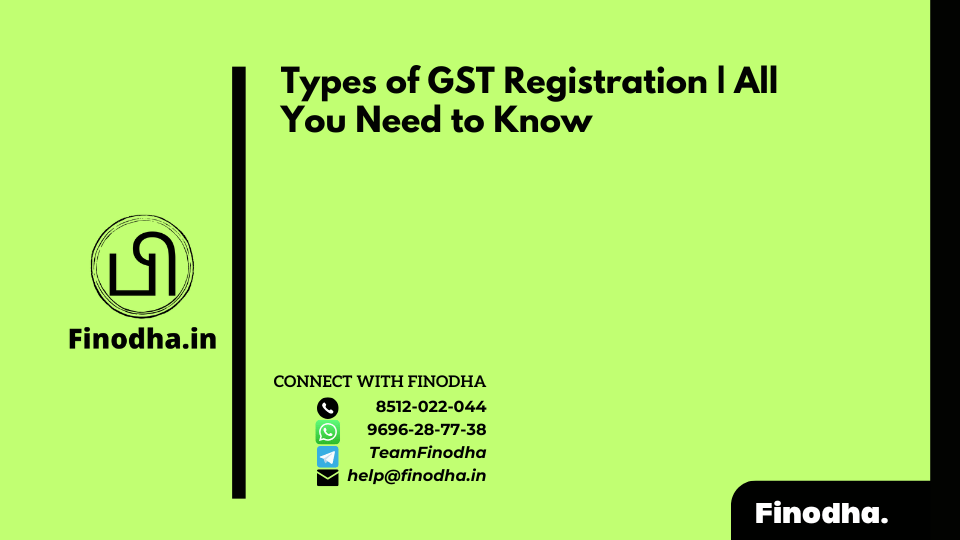Important Keywords: Apply GST Registration, File GST Return, GST Registration Cancellation.
Words: 1,611; Read time: 9 minutes.
Table of Contents
A Comprehensive Guide to the Different Types of GST Registration in India
Understanding the types of GST registration is crucial for businesses operating in India. GST registration helps ensure legal compliance with tax laws while also providing businesses with several operational advantages, including the ability to claim Input Tax Credit (ITC) and build credibility. Whether you’re a small entrepreneur or a large corporation, understanding the different GST registration types is essential for choosing the right registration for your business.
This article will guide you through the various GST registration categories, including Regular GST registration, Composition scheme GST registration, Non-resident GST registration, and others. We’ll explore the eligibility, benefits, and requirements for each registration type, helping you decide which one suits your business needs. Let’s dive into the details of the types of GST registration that can benefit your business and simplify your tax compliance.
Looking for hassle-free GST registration? Explore Finodha’s affordable and expert services to get started today!
What is GST?
GST, or Goods and Services Tax, is a unified indirect tax that replaces multiple taxes levied by the state and central governments. It is essential for businesses to be registered under GST if they meet certain turnover thresholds.
Why is GST Registration Necessary?
GST registration is mandatory for businesses that exceed the specified turnover limits. It ensures businesses comply with tax laws, reduces the chances of penalties, and increases their credibility in the market. Additionally, GST registration enables businesses to claim Input Tax Credit (ITC), which helps reduce the overall tax burden.
For businesses with interstate operations, GST registration becomes even more important. Without it, businesses cannot trade freely across state borders or claim ITC on goods and services purchased from other states. Thus, GST registration is vital for businesses to maintain smooth operations.
Overview of Different Types of GST Registration
When it comes to the types of GST registration, businesses have multiple options to choose from depending on their size, business model, and operations. Below are the GST registration categories in detail:
Regular GST Registration
Regular GST registration is the most common and applicable to businesses whose annual turnover exceeds the prescribed limits. This is the default option for businesses that supply goods or services.
- Eligibility Criteria: If your turnover exceeds ₹40 lakhs (for goods) or ₹20 lakhs (for services), you must register under Regular GST registration.
- Key Features: Businesses need to file monthly or quarterly GST returns and comply with the tax structure as per the GST Act. The tax rates depend on the category of goods or services you provide.
- Advantages: Enables businesses to collect tax from customers, claim ITC on purchases, and carry out interstate transactions without restrictions.
Composition Scheme GST Registration
The Composition scheme GST registration is designed for small businesses to simplify tax compliance. This scheme allows businesses to pay a fixed, lower tax rate based on their turnover.
- Eligibility: Available for businesses with a turnover of up to ₹1.5 crore (₹75 lakh for service providers).
- Key Features: Under this scheme, businesses pay a fixed percentage of their turnover as tax, and in return, they are not required to file detailed returns.
- Advantages: This scheme simplifies compliance for small businesses, reduces tax liability, and eliminates the need to maintain detailed accounting records. However, businesses cannot claim ITC under this scheme.
Casual Taxable Person Registration
The Casual taxable person registration is for businesses that conduct temporary operations in India, such as those participating in trade fairs or seasonal activities.
- Eligibility: Any business with a temporary or intermittent presence in India, such as pop-up shops or seasonal stalls, must register under this type.
- Key Features: The registration is valid for a short duration and can be extended. The business must apply for GST registration for each event or seasonal activity.
- Advantages: This registration helps businesses operate legally in India for short-term activities and allows them to comply with tax laws.
Non-Resident GST Registration
The Non-resident GST registration applies to foreign entities that wish to supply goods or services in India. This registration type ensures that foreign businesses can operate legally in the Indian market.
- Eligibility: Foreign businesses must register for GST if they supply goods or services in India, regardless of whether they have a permanent establishment in the country.
- Key Features: Non-residents need to appoint an authorized representative in India and comply with all GST regulations.
- Advantages: Allows foreign businesses to legally engage in business activities in India, ensuring compliance with Indian tax laws.
E-commerce Operator GST Registration
E-commerce platforms like Amazon and Flipkart must obtain E-commerce operator GST registration. This registration ensures that online marketplaces comply with tax collection and reporting requirements.
- Eligibility: Required for e-commerce operators that facilitate the sale of goods or services by other businesses.
- Key Features: The platform is responsible for collecting tax at source (TCS) from the sellers and remitting it to the government.
- Advantages: This registration ensures that e-commerce operators are compliant with GST laws, streamlining the tax collection process.
GST TDS Registration
GST TDS registration is necessary for businesses or government entities that are required to deduct tax at source while making payments.
- Eligibility: Applicable to government departments, public sector undertakings, and large businesses involved in contracts or services.
- Key Features: The deductor must withhold a percentage of the payment as tax and remit it to the government under GST TDS provisions.
- Advantages: Helps ensure that taxes are deducted at source, improving compliance and reducing tax evasion.
Detailed Comparison of GST Registration Categories
To help businesses decide which GST registration type fits their needs, here’s a comparison table summarizing the key features of each registration category:
| GST Registration Type | Eligibility Criteria | Tax Rate | ITC Eligibility | Common Use Case |
| Regular GST Registration | Turnover > ₹40 lakhs (goods) or ₹20 lakhs (services) | Standard GST Rates | Yes | Large businesses and all categories |
| Composition Scheme | Turnover < ₹1.5 crore (₹75 lakhs for services) | Lower, fixed rate tax | No | Small businesses, traders |
| Casual Taxable Person | Temporary operations (trade fairs, seasonal) | Varies based on activity | Yes | Short-term, seasonal businesses |
| Non-Resident GST Registration | Foreign business entities | Varies by goods/services | Yes | Foreign entities operating in India |
| E-commerce Operator GST | E-commerce platforms | Tax Collection at Source (TCS) | Yes | Online marketplaces, platform operators |
| GST TDS Registration | Government agencies, large businesses | Standard GST rates | Yes | Contractors, large businesses |
Steps for GST Registration
Here’s a simple, step-by-step guide to register for GST:
- Prepare the Required Documents: This includes PAN, Aadhar, business address proof, and bank details.
- Visit the GST Portal: Go to the official GST website (www.gst.gov.in) and register.
- Fill in GST Registration Form: Complete the form (GST REG-01) with your details.
- Submit Documents: Upload the necessary documents for verification.
- Verification and GSTIN Issuance: Once the documents are verified, your GST Identification Number (GSTIN) will be issued.
Advantages of GST Registration
- Legal Compliance: Stay compliant with Indian tax laws, avoiding penalties.
- ITC Benefits: Claim Input Tax Credit on purchases, reducing your tax liability.
- Increased Credibility: GST registration boosts your business’s reputation and trust with suppliers and customers.
- Expansion Opportunities: Operate across state borders and expand your market reach.
How to Choose the Right GST Registration Type for Your Business
Choosing the right GST registration type depends on various factors such as the turnover of your business, the nature of your operations, and your expansion plans. For example:
- Regular GST Registration: Best for businesses with higher turnover or interstate transactions.
- Composition Scheme GST Registration: Ideal for small businesses looking for simplified tax compliance.
- Casual Taxable Person Registration: Best for temporary or seasonal businesses.
- Non-Resident GST Registration: Essential for foreign entities conducting business in India.
- E-commerce Operator GST Registration: For businesses operating online platforms.
Consulting with a GST expert can help you determine the most suitable registration type for your business.
Conclusion
Understanding the types of GST registration available is crucial for business success in India. Whether you’re a small business opting for the Composition scheme GST registration or a large company needing Regular GST registration, choosing the correct category will ensure compliance, reduce tax burdens, and improve business credibility.
Choose Finodha for Expert GST Registration Services
Finodha offers seamless, affordable GST registration services starting at just ₹798! With quick turnaround times and expert guidance, your business will comply and thrive in no time. Contact us today to get started!
Frequently Asked Questions (FAQs)
Q1. What are the types of GST registration?
The types of GST registration include Regular GST registration, Composition scheme, Casual taxable person registration, Non-resident GST registration, E-commerce operator GST registration, and GST TDS registration.
Q2. Who is eligible for Regular GST registration?
Businesses with an annual turnover exceeding ₹40 lakhs for goods or ₹20 lakhs for services are eligible for Regular GST registration.
Q3. What is the benefit of GST registration?
GST registration allows businesses to claim Input Tax Credit, comply with tax laws, and operate legally across state borders.
Q4. Can a small business benefit from GST registration?
Yes, small businesses with turnover under ₹1.5 crore can opt for the Composition scheme to simplify tax compliance and pay lower taxes.
Q5. What is Casual Taxable Person GST registration?
It applies to businesses engaged in temporary operations, such as seasonal markets or trade fairs.
Q6. How do I apply for GST registration?
You can apply online on the GST portal by submitting necessary documents like PAN, Aadhar, and business details.
Q7. Do foreign businesses need GST registration in India?
Yes, foreign businesses providing goods or services in India must register under Non-resident GST registration.
Q8. How can e-commerce operators comply with GST?
E-commerce operators must register under E-commerce operator GST registration and collect tax at source (TCS) from sellers.
More Information: https://taxinformation.cbic.gov.in/
Read more interesting articles:




